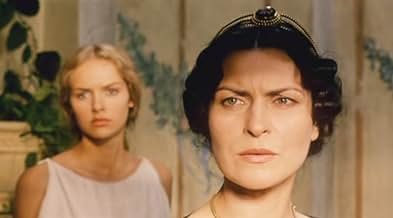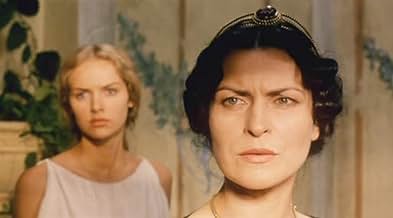IMDb-BEWERTUNG
5,7/10
2398
IHRE BEWERTUNG
Füge eine Handlung in deiner Sprache hinzuMarcus Vinicius falls in love with Lygia, but she's Christian. Marcus kidnaps her, but Ursus captures him. After meeting Nero, he returns to Rome to find Lygia.Marcus Vinicius falls in love with Lygia, but she's Christian. Marcus kidnaps her, but Ursus captures him. After meeting Nero, he returns to Rome to find Lygia.Marcus Vinicius falls in love with Lygia, but she's Christian. Marcus kidnaps her, but Ursus captures him. After meeting Nero, he returns to Rome to find Lygia.
- Regie
- Drehbuch
- Hauptbesetzung
- Auszeichnungen
- 4 Gewinne & 2 Nominierungen insgesamt
Empfohlene Bewertungen
Inevitably, this film begs comparison to the three other recent Polish historical "super-productions", Ogniem i Mieczem, Pan Tadeusz, and Przedwiosnie. Quo Vadis isn't made with quite the elegance and visual grace of Pan Tadeusz, nor is it quite as dynamic and classy as Przedwiosnie, although it is elegant, visually graceful, and dynamic. It shares similarities, unfortunately, with Ogniem i Mieczem as well: at times it reverts to Hollywood-style kitsch, such as with close-ups that take themselves too seriously, and tacky, forced, over-dramatic music. However, these elements are both less frequent and less pronounced than in Ogniem i Mieczem; and - if you allow yourself to ignore them - are overpowered by many positive elements.
Boguslaw Linda is great as Petroniusz. This is, I think, one of his best roles for years, and he produces the grace and dignity of a Roman gentleman very well. Michal Bajor's characterisation of the naive, vain Nero, at once contemptible and likeable, was for me one of the nice surprises of the film.
The scene where lions tear Christians apart in the circus is shocking and heart-wrenching, and looks almost as realistic as I could imagine is possible. The famous scene where Ursus battles the bull in the circus is, if not as spectacular as the lions, similarly effective.
Not a masterpiece, but a very good film. 8/10
Boguslaw Linda is great as Petroniusz. This is, I think, one of his best roles for years, and he produces the grace and dignity of a Roman gentleman very well. Michal Bajor's characterisation of the naive, vain Nero, at once contemptible and likeable, was for me one of the nice surprises of the film.
The scene where lions tear Christians apart in the circus is shocking and heart-wrenching, and looks almost as realistic as I could imagine is possible. The famous scene where Ursus battles the bull in the circus is, if not as spectacular as the lions, similarly effective.
Not a masterpiece, but a very good film. 8/10
Jerzy Kawalerowicz's Quo Vadis is a great adaptation, based on the novel by the Nobel Prize winner, Henryk Sienkiewicz. This is one of those films which make you wonder: What are our priorities in life? You cannot just leave the cinema and go back to reality and forget what you've seen. Wonderful acting is an unquestionable virtue of this Quo Vadis. Saint Peter played by Franciszek Pieczka, is not the esteemed, serious Saint Peter we can see on paintings or sculptures in churches, he's not this stern guardian at heaven's gate, the one who keeps the key to heaven. Ke is an eye witness of Christ's life and death, and he is a sage you may ask for advice in difficult moments of your life. He is one of us - the man who understands the love of young people - Marek and Ligia, and doesn't find anything wrong in it.
Jerzy Trela, in my opinion, in the role of his lifetime as Chilon, starts off as a comic character, as a cheater, plotter, unscrupulous liar, who isn't afraid to bertray people causing their death. For such a role, so comic and tragic, a great actor is needed. Jerzy Trela is undoubtedly a wonderful artist, the right actor for this role. I was crying with laughter at the beginning, and of emotion at the end of the film, watching his Chilon Chilonides.
A good idea, I think, was giving the role of Neron to a singing actor, Micha³ Bajor. This red-haired artist created a wonderful character, despite the role being so difficult. His musical and singing talents were spot on this film.
The best female performance was Ma³gorzata Pieczyñska's role of Acte, the only woman who really loved Neron - a love expressed so convincingly.
A breathtaking scene is the fight between Ursus (Rafa³ Kubacki) and the bull, especially, considering there were no computer or other special effects. Although Rafa³ Kubacki clearly isn't a professional actor, his fighting skills and sheer on screen power are worthy of respect.
Quo Vadis isn't a Hollywood style film. This film is not like Cleopatra or Gladiator. Comparing Quo Vadis to these films is a pointless exercise. The only thing these films have in common is the place of action: ancient Rome. The rest is quite different. The last scene of the film (I hope you will watch this film, and see this scene) begs the question: "Quo Vadis XXIst century world?"
Jerzy Trela, in my opinion, in the role of his lifetime as Chilon, starts off as a comic character, as a cheater, plotter, unscrupulous liar, who isn't afraid to bertray people causing their death. For such a role, so comic and tragic, a great actor is needed. Jerzy Trela is undoubtedly a wonderful artist, the right actor for this role. I was crying with laughter at the beginning, and of emotion at the end of the film, watching his Chilon Chilonides.
A good idea, I think, was giving the role of Neron to a singing actor, Micha³ Bajor. This red-haired artist created a wonderful character, despite the role being so difficult. His musical and singing talents were spot on this film.
The best female performance was Ma³gorzata Pieczyñska's role of Acte, the only woman who really loved Neron - a love expressed so convincingly.
A breathtaking scene is the fight between Ursus (Rafa³ Kubacki) and the bull, especially, considering there were no computer or other special effects. Although Rafa³ Kubacki clearly isn't a professional actor, his fighting skills and sheer on screen power are worthy of respect.
Quo Vadis isn't a Hollywood style film. This film is not like Cleopatra or Gladiator. Comparing Quo Vadis to these films is a pointless exercise. The only thing these films have in common is the place of action: ancient Rome. The rest is quite different. The last scene of the film (I hope you will watch this film, and see this scene) begs the question: "Quo Vadis XXIst century world?"
Filmed in 2001, the latest version of Quo Vadis is finally being released in a region 1 version with English subtitles. I waited SO long for the opportunity to see this film and it does not disappoint. While I wouldn't go so far as to say it is a "must see," I found it to be very well made on most levels and I recommend it without any reservations.
The costumes, sets, and special effects are very realistic and believable and the film makes a sincere attempt to stay true to the historical events and people on whom the story is based.
Although the burning of Rome could have been improved upon, the scene of the Christians being torn to pieces by the lions makes up for it. This scene is not over-the-top gruesome, yet remains horrifying to watch. The terror of the Christians is clearly felt,likewise, the scene of Christians being burned alive.
While every actor/actress in this film did an admirable job, the part of Petronius (played by the great Boguslaw Linda) is outstanding. In fact, Linda may have been just a little too good. Although the character of Petronius is an integral part of the storyline, the character is still that of a supporting role, however, Linda's portrayal is so powerful that in every scene in which he appears, the attention of the viewer remains riveted on Linda. This can at times make the acting of everyone else seem a little less convincing. Linda does not intentionally upstage, but rather he is so good that he can't help but stand out.This is one one of Boguslaw Linda's best performances and I would love to see him cast in more dramas.
Although this film is not preachy, it is about the early days of Christianity and the final scene of the film does leave a Christ centered message.This message can be interpreted several different ways, but to me, the message was that faith in Christ as well as obedience to his teachings is still imperative in the modern world and a necessity in order to achieve salvation. Hence the title of the film, Quo Vadis?; where are you going?
The costumes, sets, and special effects are very realistic and believable and the film makes a sincere attempt to stay true to the historical events and people on whom the story is based.
Although the burning of Rome could have been improved upon, the scene of the Christians being torn to pieces by the lions makes up for it. This scene is not over-the-top gruesome, yet remains horrifying to watch. The terror of the Christians is clearly felt,likewise, the scene of Christians being burned alive.
While every actor/actress in this film did an admirable job, the part of Petronius (played by the great Boguslaw Linda) is outstanding. In fact, Linda may have been just a little too good. Although the character of Petronius is an integral part of the storyline, the character is still that of a supporting role, however, Linda's portrayal is so powerful that in every scene in which he appears, the attention of the viewer remains riveted on Linda. This can at times make the acting of everyone else seem a little less convincing. Linda does not intentionally upstage, but rather he is so good that he can't help but stand out.This is one one of Boguslaw Linda's best performances and I would love to see him cast in more dramas.
Although this film is not preachy, it is about the early days of Christianity and the final scene of the film does leave a Christ centered message.This message can be interpreted several different ways, but to me, the message was that faith in Christ as well as obedience to his teachings is still imperative in the modern world and a necessity in order to achieve salvation. Hence the title of the film, Quo Vadis?; where are you going?
I have found great pleasure in reading the book and I must say that I really enjoyed watching the movie too. Great performance, great actors and especially a great sensibility. Unless the old movie I really felt like I was watching the 'book'. I liked most the performance of the actors that interpreted Petronius and Marcus Vinicius. Boguslaw Linda is an exceptional actor or at least in this movie his performance was perfect. The settings gave me the impression of reallied not fakes like most of the Hollywood 'masterpieces'. I felt like the movie was the 'sequel' of the book, no alterations, no personal interpretations. Jerzi Kawalerowicz is a great director and producer and his showed this in the high quality of this movie.
During 63 a.d. Roman , a prefect official named Marco Vinicio returns from war and he get home his uncle Petronio , friend of emperor Nero . Vinicio confesses him he is enamored Ligia , a mysterious and virginal young whom has known in the Aulus Paucius's home . Marcus Vinicius meets Lygia in Rome and falls in love . But she is Christian and doesn't want anything to do with him . In a party Vinicio tries to utilize to Lygia but she is helped by Ursus who carries her at a place of Christ's supporters . Later on , Christians are accused of burning ancient Rome . Vinicio risks his life to save his lover .
The motion picture is a larger than life production upon Nero and the Christians persecutions with lots of crowd scenes . It's realized on a giant scale with moving fighting scenes , dramatic scenes , spectacular sequences and bloody gladiator combats in the arena and lions attacks and Christian martyr . Depraved emperor want to get rid and he orders use like meat for lions and burn them on stakes . The Polish cinema's first great financial success but with unknown actors for general public although allegedly are famous in Poland . The picture is profitable by public tendency for ¨sword and sandals¨ genre re-initiated by ¨Gladiator¨ . The film is a definitive version of the classic novel by the Polish Henryk Sienkiewicz (Nobel prize winner) . Special mention to enjoyable music score by Jan Kaczmarek (Oscar winner for ¨Finding Neverland¨). The movie obtained three ¨Eagle Award¨, the greatest prize of Polish cinema , to the best gowns , production design and support cast. The motion picture was well directed by Jerzy Kawalerowicz (Pharaoh) . Rating : Good and entertaining.
The motion picture is a larger than life production upon Nero and the Christians persecutions with lots of crowd scenes . It's realized on a giant scale with moving fighting scenes , dramatic scenes , spectacular sequences and bloody gladiator combats in the arena and lions attacks and Christian martyr . Depraved emperor want to get rid and he orders use like meat for lions and burn them on stakes . The Polish cinema's first great financial success but with unknown actors for general public although allegedly are famous in Poland . The picture is profitable by public tendency for ¨sword and sandals¨ genre re-initiated by ¨Gladiator¨ . The film is a definitive version of the classic novel by the Polish Henryk Sienkiewicz (Nobel prize winner) . Special mention to enjoyable music score by Jan Kaczmarek (Oscar winner for ¨Finding Neverland¨). The movie obtained three ¨Eagle Award¨, the greatest prize of Polish cinema , to the best gowns , production design and support cast. The motion picture was well directed by Jerzy Kawalerowicz (Pharaoh) . Rating : Good and entertaining.
Wusstest du schon
- WissenswertesNever given a wide release in the U.S., its only engagement (so far) in the U.S. was in Los Angeles, California, in 2002. The film has also never been shown on U.S. cable television.
- PatzerIn the final episode the Emperor Nero is fleeing Rome, afraid of being killed by the mob or the new Emperor Galba. He attempts to hide in a thicket of prickly pear cactus and agave plants, both of which are native to the Americas and unknown in Europe until the 1500s, approximately 1450 years after Nero's death.
- Alternative VersionenOn December 25, 2003 the first channel of Polish public television aired first episode of the television version of the movie. It contains of six episodes and is more than 100 minutes than the theatrical edition. Many scenes, previously deleted, were included in the mini-series.
- VerbindungenVersion of Quo Vadis? (1901)
Top-Auswahl
Melde dich zum Bewerten an und greife auf die Watchlist für personalisierte Empfehlungen zu.
- How long is Quo vadis?Powered by Alexa
Details
- Erscheinungsdatum
- Herkunftsländer
- Offizielle Standorte
- Sprache
- Auch bekannt als
- Quo vadis
- Drehorte
- Produktionsfirmen
- Weitere beteiligte Unternehmen bei IMDbPro anzeigen
Box Office
- Budget
- 18.000.000 $ (geschätzt)
- Laufzeit2 Stunden 45 Minuten
- Farbe
- Sound-Mix
- Seitenverhältnis
- 1.85 : 1
Zu dieser Seite beitragen
Bearbeitung vorschlagen oder fehlenden Inhalt hinzufügen

Oberste Lücke
By what name was Nero - Der Tyrann Roms (2001) officially released in India in English?
Antwort





































